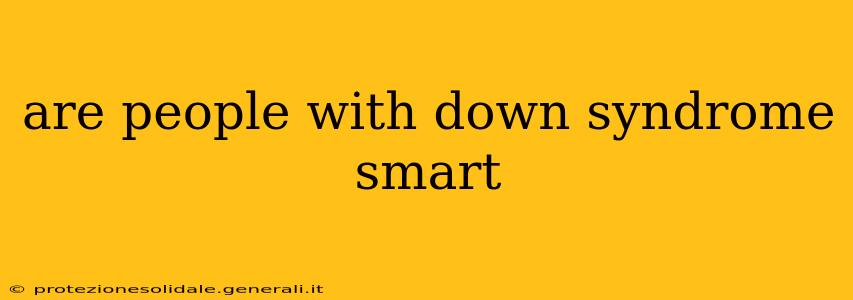The question of whether people with Down syndrome are "smart" is fundamentally flawed. It's a question that frames intelligence in a narrow, limiting way, overlooking the vast spectrum of abilities and individual differences within any population, let alone one as diverse as those with Down syndrome. Instead of focusing on a single, potentially misleading metric like IQ, it's far more accurate and helpful to understand the unique cognitive profiles of individuals with Down syndrome and celebrate their strengths.
What is Down Syndrome?
Down syndrome is a genetic condition caused by an extra copy of chromosome 21. This extra chromosome affects development and can lead to a range of physical and intellectual characteristics. However, it's crucial to understand that the impact of Down syndrome varies significantly from person to person. There's no single "Down syndrome experience," and individuals will present with diverse abilities and challenges.
How Does Down Syndrome Affect Cognitive Development?
Individuals with Down syndrome typically have some degree of intellectual disability. However, the severity of this disability is highly variable. Some individuals might experience mild delays, while others may face more significant challenges. It's crucial to remember that:
- Intellectual disability is not the defining characteristic of Down syndrome: Many individuals with Down syndrome demonstrate significant strengths in other areas.
- Cognitive skills develop at different rates: While there may be delays in certain areas, with appropriate support and intervention, individuals can achieve significant progress.
- Strengths often outweigh challenges: Many individuals with Down syndrome display remarkable abilities in areas like memory, social skills, and artistic expression.
What are the Strengths of People with Down Syndrome?
People with Down syndrome often possess remarkable strengths, including:
- Exceptional social skills: Many demonstrate exceptional empathy, warmth, and a genuine desire to connect with others.
- Strong visual learners: Many individuals learn best through visual aids and hands-on activities.
- Excellent memory for faces and details: This strength can be particularly useful in various social and occupational settings.
- Artistic talents: Many people with Down syndrome exhibit significant artistic abilities, demonstrating creativity through music, art, and dance.
What Support and Interventions are Available for Individuals with Down Syndrome?
Early intervention and ongoing support are crucial in helping individuals with Down syndrome reach their full potential. These supports can include:
- Specialized education: Educational programs tailored to the individual's needs can help them learn and develop at their own pace.
- Therapy: Occupational therapy, physical therapy, and speech therapy can help address specific challenges and improve functional skills.
- Medical care: Regular medical check-ups are essential to monitor health and address any potential complications.
What are Common Misconceptions about Down Syndrome and Intelligence?
Unfortunately, there are persistent misconceptions about Down syndrome and intelligence. It's vital to debunk these:
- "People with Down syndrome are not capable of learning." This is completely untrue. With appropriate support, many individuals with Down syndrome can achieve significant educational and personal milestones.
- "People with Down syndrome are all the same." This is a harmful generalization. Individuals with Down syndrome demonstrate a wide range of abilities and personalities.
- "People with Down syndrome cannot lead fulfilling lives." This is false. With appropriate support and opportunities, people with Down syndrome can lead happy, productive, and meaningful lives.
H2: How Can I Support Individuals with Down Syndrome?
Supporting individuals with Down syndrome involves celebrating their strengths and providing opportunities for them to thrive. This can involve advocating for inclusive education and employment practices, promoting understanding and acceptance within communities, and simply treating individuals with the same respect and dignity afforded to everyone else.
In conclusion, focusing on whether people with Down syndrome are "smart" misses the point. The real question is how we can best support their individual growth, celebrate their unique talents, and create a world where everyone can reach their full potential. It's a matter of understanding, acceptance, and providing the right opportunities.
